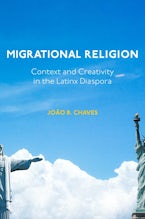What happens when conservative evangelical Baptists from Rio, São Paulo, and elsewhere in Brazil find themselves in New York City, Washington, DC, and other American cities? They become dynamic Brazuca communities featuring Bapticostal tendencies, cultivating multidenominational networks and relationships, welcoming and developing women ministers, and caring for undocumented brothers and sisters moving north-and-south and west-and-east while crisscrossing the Western hemisphere. For those with ears to hear, João Chaves' account helps us anticipate not just the ongoing 'browning' of the North American church but also its transnationalization, pentecostalization, and hybridization.
~Amos Yong, Professor of Theology & Mission and Dean of the School of Mission & Theology, Fuller Seminary
Close study of a range of Brazilian Baptist churches in the United States has enabled João Chaves to demonstrate that the experience of immigration has shaped their identity. They wrestle with the problem of undocumented members being technically in breach of the law; and they accept charismatic practices and female ordination because of influences from Brazil. Chaves successfully shows that the Brazilian Baptists of America have created a form of ethnic denominationalism.
~David Bebbington, Emeritus Professor of History, University of Stirling
Migrational Religion is an enlightening transnational religious history that, while focusing on the specific case of Brazilian Baptists in the United States, produces substantial implications for studying world Christianity and migration in various contexts. By interrogating multidirectional missional perspectives, this border-crossing narrative complexifies conversations about missionary transmission, indigenous agency, and identity formation in the context of migration. A migrant himself, with first-hand formative experience in migrant congregations, João Chaves understands his interlocutors as very few others do. He masterfully interweaves the stories of individuals, congregations, and transnational migrant networks, underscoring their impact across nations, cultures, and faith communities. Migrant Christians are portrayed through the liminality of a transient context, which is changed by their very presence, but which simultaneously changes them in the process. This book is, therefore, a welcome addition to the burgeoning literature on religion and migration. However, make no mistake. This volume is not just another study on global-South migratory religion. In fact, it shows the significance of faith in the experience of migration through new and provocative lenses, drawing attention in particular to the often-underestimated reach of transnational religious networks and the rise of influential transnational religious leaders who have become powerbrokers uniquely skilled to navigate a complex web that includes undocumented immigrants, educators, business owners, and politicians.
~Raimundo C. Barreto, Associate Professor of World Christianity, Princeton Theological Seminary
This is an excellent study of the pivotal topic of religion and migration, with enlightening comments on transnational networks, denominations, and leadership.
~Philip Jenkins, The Christian Century
Migrational Religion is nothing short of a monumental contribution for those particularly interested in Baptist 1 Iistory, Latinx Religion, and/or World Christianity.
~Robert V. Martinez, Baptist History and Heritage Journal
... Migrational Religion is an excellent resource for students and scholars not only of World Christianity but also in the fields of Latinx Studies, American Religious History, Theology, and Migration Studies.
~Matheus Reis, International Review of Mission
... Migrational Religion displays how engaged scholarship can organically emerge from top-notch analysis, as Chaves’s nuanced history of Brazuca Baptist life reveals.
~Tyler B. Davis, Latino Studies
Migrational Religion offers a conceptually sound and historically rich approach to the study of Brazilian Baptists in the US. Chaves argues that Brazilian Baptists' 'experiences of migration and adaptation affect the role of identity of particular immigrant faith communities.
~Lloyd Barba, Journal of Ecclesiastical History

